Hundreds more criminals tagged in Scotland
Hundreds more criminals were fitted with electronic tags last year as Scottish ministers increased the use of tracking technology.
Research has revealed 5,801 people were issued with monitoring orders in 2023/24, a 14 per cent rise on the previous year.
The increase comes as jails get ready to release of hundreds of inmates in the new year under emergency legislation triggered by a swelling prison population.
Use of the technology splits opinion, with advocates arguing it helps with reintegration to society while placing limits on offenders who may still pose a threat.
Research published today by justice publication 1919 Magazine shows that the vast majority of criminals tagged last year were adult males, although the number of women fitted with a tag also rose sharply.
Among the total number, published following a Freedom of Information request, were 88 under-18s.
Every council in Scotland now has the capability to monitor criminals on bail electronically, while it is stated Scottish government policy for the practice to continue to expand.
It has become even more of a priority as prisons try to manage burgeoning populations.
While politically controversial, the move to prematurely release criminals after just 40 per cent of their sentence won support from organisations representing prison officers and governments.
Some criminals, including those convicted for domestic violence, will not be eligible for the scheme, although – unlike the last round of early releases – prison governors will not have a veto.
Similar initiatives have taken place in England, where jails are also facing capacity issues.
Kate Wallace, chief executive of Victim Support Scotland, told 1919 Magazine: “With prison populations at an all-time high, we know that measures must be taken to reduce the number of people in prison, including alternatives to custody such as electronic tagging.
“However, these solutions need to be fit for purpose and actively prioritise the safety of victims and the wider public.
“Worryingly, we have heard anecdotal evidence of people evading home detention curfew measures and harassing victims.
“We do have concerns about the effectiveness of electronic tagging and have called for investment in the home detention curfew and monitoring technology, such as the introduction of more accurate GPS tracking, to provide better safeguards.”
Scottish Conservative justice spokesperson Liam Kerr said: “With jails bursting at the seams and tagging at a record high, the SNP’s reactive and reductionist approach is in disarray.
“There is a place for electronic monitoring, but it cannot be a replacement when custodial sentences are required.
“The Scottish government’s long-term failure to take a holistic, strategic approach to Scotland’s justice system is leading to ever more dependence on monitoring whether it’s the right alternative or not.”
A spokesperson for the Scottish government said: “Courts and other justice authorities consider electronic monitoring to be a reliable and appropriate tool to support a person living in the community rather than being held in custody.
“Confidence in electronic monitoring can be seen through the high use being made of the measure.
“Public safety and any potential risk to victims are key factors in determining suitability for electronic monitoring, and that informs what curfews or restrictions away from particular places may need to be put in place.”


